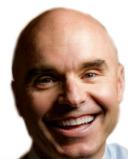Anger
Chasing Meaningless Tokens
Doing what matters is one of the kindest things you can do for yourself
Posted September 9, 2010

I've been away from this blog working on a new book called "Your Life on Purpose." That book was damn hard to write. The writing became intensely personal and for good reason. After all, how we live matters a great deal, and facing that can be quite painful (and good too). I imagine I'm not alone in saying that.
The process of writing brought the awareness of what matters squarely into my mind's eye. And, it got me thinking about the peace of mind that we all seek. We can feel as though we are working harder and harder, but for less and less. And at some point, inevitably, the whistle will blow and the clock will run out. And then, we'll be faced with the inevitable truth of what we had become, how we've lived, and whether it really mattered that we lived at all.
I say all of this not as a downer, but as an opportunity to take stock. True peace of mind may depend less on our psychological and emotional weather, and may have everything to do with whether we are living our lives in alignment with our core, our deepest desires and values. After all, whether we do that or not, and how consciously we do chose to do what matters (even when faced with the inevitable pain of life) will add up to a life lived well or not. And, maybe that's what really matters in the end.
I, for one, have been to many funerals in my lifetime, and never once did I hear a eulogy where the words were something like "Sarah was so good at challenging her negative thoughts and disputing her beliefs," or "Sam had a real knack for relaxing away his panic ... he had that diaphragmatic breathing down." No. People don't say those things at funerals. And why?
Maybe, the reason people don't speak about such things is that, in the end, they really don't matter much. Rather, if you listen to the words uttered about someone who had passed away, you'll hear comments about what people stood for, their generosity, kindness, fortitude, grace, good will, giving spirit, gentle smile, ability to brighten a dark moment, good humor, strong work ethic, contribution to their friends, family, community, and loved ones. That's what people speak about.
But, here's the deal ... we can lose sight of that by beating the cultural drum of "feelgoodism" -- think and feel better, and you will live better. It's everywhere you look, and a great set up for despair. All of us know one or more persons who violate this rule on a daily basis. It may even be you or someone you love. No tombstone that I've seen reads "Now I Feel Better." Maybe someone will be creative enough to do that, but honestly if they had the money to carve words in a headstone, I doubt most would opt for the four words I just mentioned." Life just seems to be bigger than what we feel or think, or at least I've come to think so.
During the writing of Your Life on Purpose, a friend shared this with me. The words are these: “The secret to achieving inner peace lies in understanding our inner core values – those things in our lives that are most important to us-and then seeing that they are reflected in the daily events of our lives.” Hyrum W. Smith
He knew what I was working on, and also knew that I was going through a rough spot. The words were not his, but notheless resonated with me. I share them with you now because I believe there is wisdom in what they say if you allow yourself to linger with them a bit.
It has taken me most of my adult life to make sense of those words, and as of this writing I am in my early 40s and still working at living out what they say. This point was not lost on me while writing Your Life on Purpose. And, I'll just close with an exerpt from the book. It's a story of a guy who had been living chasing what I call "meaningless tokens." See if any of this resonates with you up until know.
Meaningless Tokens

Meaningless Tokens
Just about everyone will come to a point when they pause to consider how they’ve been living their life. Steven, a forty-three-year-old entrepreneur, arrived at this moment almost by accident. He was living the good life by most standards. He had his health, a nice home, a loving marriage, two cars, a dog, and a new baby girl.
Steven also greatly enjoyed his work, so much so that he spent countless hours at the office writing, creating, and problem solving. And when he wasn’t doing that, he was traveling and networking with colleagues around the globe.
Awards and accolades followed, and like an addict looking for a fix, he chased them with unbridled ambition. Steven worked harder and harder, often seven days a week. He poured himself into his career, while his wife focused on the home and raising their daughter. She supported his long hours and late nights at work. Life was just fine, or so it seemed.
Flash-forward three years. Steven was on a business trip to attend a convention where he was to receive another award for his accomplishments. After receiving the award, he and the group settled down to listen to a talk by the keynote speaker, who also happened to be a noted child psychologist. The speaker opened with a story about a study he had done long ago.
The story, as Steven shared it, had to do with a project to help kids be more focused in the classroom. What the researchers did was really quite simple. When kids raised their hands, sat in their chairs, and spoke when called on, they would earn a little token—a small object like a poker chip. And if they were disruptive, they’d lose a token. At the end of the day, all the kids in the classroom could cash out their tokens for small prizes. This continued for several weeks.
The token system worked like a charm. Disruptive classroom behaviors vanished. Kids were learning and paying attention. Seeing the success of this little intervention, the research team decided it was time to slowly fade out the prizes, and eventually there were no more prizes given for tokens earned during the day.
Now if you’re guessing that this backfired, you’d be wrong. Even without the prizes, the kids continued to work extremely hard for the tokens, although they had no value and were essentially meaningless.
With that punch line, Steven sank into his chair and stared blankly at the plaque sitting in his lap. “Is this a meaningless token?” he wondered. And with a clarity he hadn’t had before, he saw that he was just like those little kids, chasing things that didn’t matter all that much in the end.
He knew that chase. He’d been chasing professional successes, recognition of his value and self-worth, approval, status and prestige, and on and on. He was a master at collecting tokens. Awards littered his office walls and bookshelves. Yet none of it ever satisfied a burning emptiness inside. In this watershed moment, Steven began to ask himself, "What really matters in my life?”
But old habits die hard, and sometimes we need a nudge. Sunday morning after his trip, Steven was once again getting ready to head into the office, as he usually did. As he was gathering his things, his three-year-old daughter approached and clung to his leg. He looked down at her, and she looked back up at him.
As he stooped down to say good-bye with a hug and peck on the cheek, his daughter whispered “Does Daddy have to work today?” And with that, Steven felt his heart being ripped out of his chest. He knew the answer: No, he didn’t have to work today.
There, in that moment and in those little eyes, Steven saw his legacy as a father and his lasting impact on this world. It was staring him right in the face. How would she remember him? How would others remember him? What would be his lasting impact on her life and on the world?
These questions made him see that he wanted to make a difference in the lives of others, and this was to become the guiding force steering Steven’s life choices. In this way, he discovered his values, his role in the grand scheme of life, and his enduring legacy.
This epiphany was no accident. Like a perfect storm, things came together. Memories from long ago surged in like a tidal wave. He was propelled to his childhood, recalling how his dad was always at the office and how that hurt. And, this brought to mind the beautiful and haunting rendition of "The Hurt" by Johnny Cash and the lyrics -- ”what have I become, my sweetest friend ... Everyone I know goes away
in the end."
This was the final straw, the kick in the pants that led Steven to say enough is enough. Steven never worked on weekends again. He made a choice to protect that time for his wife and daughter.
--------------------------
You may feel as though you’re living a life like Steven’s—chasing tokens that seem so important now but won’t matter that much in the end. But here's the deal, you still have time to change direction, find what matters, and write the story of the rest of your life. And yes, this can be difficult, but the journey in vital directions can dignify enormous pain and bring a lasting sense of peace. Learning to meet that difficultly with skills that foster peace, spaceousness, awareness, and kindness and compassion can help you move forward too, especially when pain and difficulties seems to stand in your way. That's what the science is now showing.
Oh, and if it's any consulation, Steven's story is an exerpt from my story -- a moment in my life journey.
With a Kind Heart,
John P. Forsyth
Author of The Mindfulness and Acceptance Workbook for Anxiety, ACT on Life, Not on Anger, and a professional book called Acceptance and Commitment Therapy for Anxiety Disorders: A Practitioner's Guide. His forthcoming book, Your Life on Purpose, will be available on Amazon and most major bookstores in November 2010.




